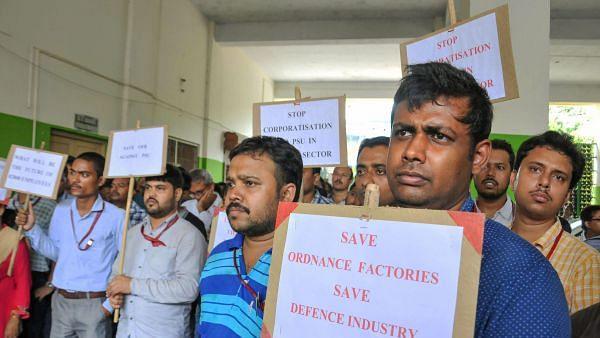OFB: Ahead of Indefinite Strike, Centre Empowers Itself to Penalise Workers in ‘Essential Defence Services’

Image Courtesy: National Herald
In a move that is being seen as a “draconian” response to the defence federations’ call for an indefinite strike against the dissolution of the Ordnance Factory Board (OFB), the Centre on Wednesday issued an ordinance, allowing itself to prohibit agitation and strike action by those engaged in essential defence services.
Titled 'The Essential Defence Services Ordinance, 2021', the gazette notification promulgated by the President of India empowers the Narendra Modi–led Central Government to issue an order for prohibiting strikes by employees involved in production of defence equipment, services and operation or maintenance of any industrial establishment connected with the military as well as those employed in repair and maintenance of defence products.
The order, according to the notification, shall stand for six months but can also be extended by the Centre if it deems it so necessary “in the public interest.”
“Any person, who commences a strike which is illegal under this Ordinance or goes or remains on, or otherwise takes part in, any such strike, shall be punishable with imprisonment for a term which may extend to one year or with fine which may extend to ten thousand rupees, or both,” the gazette notification, issued on the lines of The Essential Services Maintenance Act, 1968, said. It added that those instigating others to take part in a strike declared as illegal under the ordinance, or provide financial aid to such actions, will be penalised too.
Alongside allowing for the usage of police force to ensure “functioning, safety or maintenance of the essential defence services,” the notification also empowers the management to dismiss an employee participating in the strike action without an enquiry.
‘Draconian’ and ‘Brutal’: Defence Federations on Ordinance
The latest move by the Centre is being seen in the backdrop of the announcement by recognised defence federations for an indefinite strike from July 26. A notice in this regard was to be submitted on July 8.
Days after the Modi government decided to dissolve OFB and replace it with seven government-owned corporate entities, the three recognized federations – All India Defence Employees’ Federation (AIDEF), Indian National Defence Workers’ Federation (INDWF), and the RSS-affiliated Bharatiya Pratiraksha Mazdoor Sangh (BPMS) – had recorded their opposition to the Centre’s corporatisation move in a joint statement.
Engaged in defence equipment manufacturing, OFB currently operates as a government department under the control of DDP, which is administered by the Ministry of Defence (MoD). The board oversees the functioning of 41 ordnance factories across the country which employ nearly 80,000 workers.
“It is a draconian and brutal attempt by the Modi government,” C.Srikumar, general secretary, AIDEF, told Newsclick over the phone on Thursday. He added that the defence employees won’t “surrender”, but the federations will “surely have to discuss” the “form of struggle”.
A meeting between the representatives of the recognised defence federations and others is scheduled for Thursday evening where, in light of Wednesday’s development, the future course of action will be discussed, Newsclick has learned.
In a statement issued on Thursday, the Centre of Indian Trade Unions (CITU) denounced the “hasty promulgation” of the Ordinance, which, it said, was to “curb the united struggle of the Defence Production Employees and Workers against the move for privatisation of Ordnance Factories network through corporatisation.”
It added that the decision was in “total violation of the assurance given to the united platform of Defence Employees Federations” by the Centre in October last year and that it was a “dubious ploy to pre-empt and curb the united struggle of the defence production workers in stout defence of national interests and is totally condemnable.”
“The ordinance by the Centre is an attempt to intimidate the agitating defence employees,” Mukesh Singh, general secretary, BPMS, said. He stressed that even in the past the defence federations haven’t done anything “illegal”, and will continue to wage their struggle in a “legal manner.”
“Above all, we believe that within the democratic setup in the country, the Centre will give us an equal chance to voice our concerns against its policy decisions,” Singh said.
Sharing a similar sentiment in a statement issued on Thursday, the All India Trade Union Congress (AITUC) demanded the withdrawal of the ordinance. “The defence employees have no interest in disrupting defence production. In fact they are urging that the national defence production capability be kept free of any obstacles from profit-mongering corporates for the sake of national security,” the central trade union said.
‘ESMA Being Used in the Wrong Manner’
Wednesday’s gazette notification was on the lines of a law from 1968 that was enacted to maintain “certain essential services and the normal life of community.” Known as ESMA, the Act includes a long list of “essential services” in its charter, ranging from railways to postal operations, in which the employees are prohibited from striking work.
“The Act was enacted then to ensure that some services, deemed essential, are made available at all times to the public,” Sanjay Singhvi, a senior advocate, told Newsclick. However, he said what had been seen over the years, is that the “Act is used in a wrong manner to take away the right of the workers to strike.”
In recent years, the ESMA has also been invoked by the numerous state governments under the shadow of COVID-19. For example, since May last year, provisions of ESMA were invoked in the state of Uttar Pradesh, prohibiting strikes in all state departments and corporations for six months – this period was extended for the third time in May this year.
Similar was the case in Madhya Pradesh, where, faced with an en-masse resignation of junior doctors working in the government medical colleges as part of a state-wide protest, the Bharatiya Janata Party (BJP) government imposed ESMA on health services.
On the latest ordinance prohibiting strikes in the ”essential defence services,” Singhvi argued that it must be challenged “legally in court”.
Get the latest reports & analysis with people's perspective on Protests, movements & deep analytical videos, discussions of the current affairs in your Telegram app. Subscribe to NewsClick's Telegram channel & get Real-Time updates on stories, as they get published on our website.























